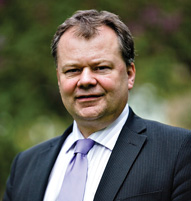We conclude here our interview with Dave Humphries, pictured, Director of Partnerships and Interventions, at the Security Industry Authority (SIA), on the UK private security regulator’s review of the 11-year-old approved contractor scheme.
Dave did stress that the SIA wants to hear from you. “We are really keen that as many people as possible contribute; we have various means by which they can do so; probably the most obvious is the website portal and offer their views. But there are also specialist focus groups, if anybody is particularly keen to give a detailed opinion about the approved contractor scheme; we would love them to get involved as well. We really want people’s views, and as many as possible. It’s a window that isn’t open for ever.”
Professional Security brought up something that cropped up at a national stakeholder meeting by the SIA in London, earlier in the year – that Dave attended, so he knows it; one around the table spoke of the phenomenon of recruiting SIA-badged staff through social media; the call for badged people, and then almost gangmaster-like touting those who reply to events or whatever place requires guarding or stewarding. While the traditional guarding sector might see that as a threat, and indeed people who grew up before the virtual world and such phrases as ‘gig economy’, might find it distasteful, it’s a threat precisely because it can under-cut, being without overheads except a connected device. In fairness, that’s not confined to security services; indeed, that’s part of the problem, including maybe for the private security sector regulator; such a service could be offered by anyone.
Dave did acknowledge the impact of such a method of doing business. “We take the view that if people are properly licenced, at the right standard, there need not necessarily be an issue that concerns us, because we are about standards and people working legally and in compliance with our regime. How they get to the marketplace is less of a concern to us.” Dave, then, returned to ‘standards’; if such methods lead to lower standards, ‘then we are bothered’. He returned also to the buyers; they (and any middle-men) still need to do due diligence, about who’s ultimately deployed: “The standard must be maintained is what concerns us.”
Professional Security also raised a more fundamental problem with the ACS; that it’s something of a Cinderella (although we didn’t use that particular word to Dave) – compared to the SIA licence, the badge that the public has seen for years now, whether around the arm of a doorman at a pub, or on a lanyard of the uniformed guard in a shopping centre. The ACS doesn’t have that visibility (that word we did use) of the badge. Dave accepted the point about visibility; although pointing out that the ACS does have a logo, that members can use (and it’s a crime if someone uses it, and they aren’t entitled to). But he asked a fair question of his own; who does the ACS need to be visible to? “And I think an important community there is those buyers of security. I think we would accept there’s a lot more to be done with that group of buyers, to explain to them what ACS is in the first place; but also the benefits of using an ACS provider. Awareness levels are much lower than we want it to be,” and that is one of the aims for the revised scheme; that buyers (excuse the pun) buy more into ACS.
Dave made a point aimed at buyers, that they should know what they are getting, whether quality or buying on price and taking a chance on quality, and taking a risk on their reputation, ‘because often security is the first person that the customer meets’, whether on the door of a shop or a pub. In a striking phrase, Dave suggested that if a buyer of security is not using an ACS company, ‘they are hitting the gamble button’. “I think there is lots of work to be done there, but if the new scheme is based on this consultation, it will take account of buyers in terms of how the scheme will work best for them.”
Someone else with an interest in security guards and the ACS that Dave went on to is the police; the SIA wants to promote police working in better partnership with private security. As Dave said, naturally police forces want some assurance about the quality of security that they are working alongside (and to leave Dave once more, to complicate the landscape further, police forces can themselves badge guarding firms and officers, whether contractors or from housing associations or local government, or even Welsh cyclists as marshals; under the Community Safety Accreditation Scheme, CSAS, one more acronym to remember). Here Dave went on to some of the topics that Ed Bateman covered in his talk to ST17; private security as extra eyes and ears, doing police-style work, reducing violence in the night-time economy and elsewhere, safeguarding the vulnerable, such as against ‘modern slavery’; and countering terror. Dave had no need, then, to spell out how useful the work of private security is. How to arrange the ACS, and how to give others such as police trust and confidence in what it stands for, are more for the review.
To take part in the review; visit http://www.pyetait.com/ACSReview.









